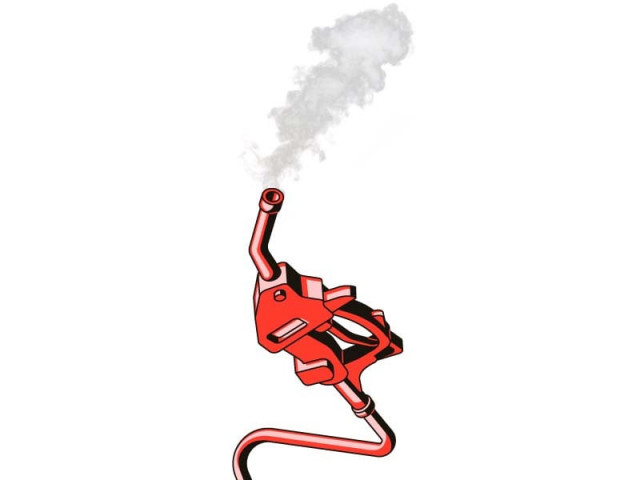ECC allows export of more sugar
Gives directives for acquiring Rs50b loan for PSO on back of sovereign guarantee

The government on Tuesday allowed export of an additional 150,000 tons of sugar on the basis of “factually incorrect” production figures, and took ad hoc decisions for continued supply of imported gas and urea to temporarily avoid a budget cost of Rs130 billion.
Instead of giving Rs100 billion in additional budget to save Pakistan State Oil (PSO) from default, the Economic Coordination Committee (ECC) of the cabinet directed that a loan of Rs50 billion should be raised from banks on the back of sovereign guarantees.
The ECC also did not take urea pricing and gas supply cost related decisions to save another chunk of about Rs30 billion on account of subsidy against the imported urea and supplying subsidised gas to two plants.
However, it rushed to approve export of 150,000 tons of sugar while also formalising the role of Pakistan Sugar Mills Association (PSMA) in export. In the past, the association was accused of manipulating sugar price by the Competition Commission of Pakistan.
The ECC, on the recommendation of the Sugar Advisory Board (SAB), allowed export of 250,000 tons of sugar inclusive of the previously permitted 100,000 tons on first-come, first-served basis, according to the Ministry of Finance.
It decided that the total quantity of export may be distributed among provinces based on their installed crushing capacity to be determined by PSMA, stated the finance ministry.
The ECC also decided that dollar proceeds of exports would be recovered within 60 days of opening a letter of credit (LC).
However, the government showed unusual haste in allowing sugar export while ignoring the fact, which was brought before it by the food ministry, that the sugar consumption and stock figures were factually incorrect.
The ECC was informed about SAB’s observation that there were variations and inconsistencies in the data provided by the provinces and the Federal Board of Revenue (FBR).
Provinces were repeatedly changing their figures of sugar consumption and production and resultantly the projections of production did not appear to be factually correct, the ECC was told.
However, the committee still went ahead with the decision to allow export of the commodity.
PSO bailout
The finance ministry said that in order to enable PSO to continue to meet its payment obligations to LNG suppliers as well as maintain the LNG supply chain, the ECC allowed release of Rs10 billion in budgeted subsidy to the Petroleum Division and allowed a government guarantee for bank financing of up to Rs50 billion.
However, the decision was not in line with the recommendation made by the Petroleum Division.
Earlier, the Petroleum Division had proposed that in order to enable PSO to remain afloat as well as to avoid any threat of breakdown of the LNG supply chain, a financing of Rs119 billion was needed.
It requested the release of the remaining budgeted amount of nearly Rs19 billion and also sought Rs100 billion more as a supplementary grant for meeting SNGPL’s accumulated and anticipated cost of LNG diversion to domestic consumers.
Instead of booking the liability today, the government has deferred it for tomorrow by going for a bank borrowing option. Due to such decisions in the past, PSO and SNGPL are constantly facing default risks.
PSO is importing around nine LNG cargoes per month and has furnished the projected net liquidity requirement of Rs263 billion from November 2022 to March 2023.
The ECC was informed that SNGPL would likely face the issue of full cost recovery from the domestic sector, where sales were made at an average gas price of Rs450 per mmbtu.
In addition to that, RLNG sales to two fertiliser plants were being made at the ECC-approved concessionary price of Rs839 per mmbtu, which was resulting in subsidy accumulation, as the budgeted subsidy of Rs15 billion was only sufficient to meet claims up to August 2022. Subsidy claims till November 2022 were overdue.
Against the accumulation of LNG diversion claims of Rs174 billion for FY19 to FY22, the government released Rs60.7 billion by the end of FY22, which was provided as supplementary grants under the subsidy head of the Petroleum Division.
The anticipated RLNG diversion cost is estimated at Rs105 billion from November 2022 to February 2023 for supply of costly LNG to domestic consumers on the SNGPL network to meet demand during winter months.
However, it was the finance ministry that opposed the decision to give Rs100 billion more from the budget and offered sovereign guarantee against bank financing of up to Rs50 billion.
PSO was of the view that if the funding line was arranged by the government, then the government may pick up the interest and finance cost on loan, else it would lead to non-profitability of the company.
Decisions deferred
The Ministry of Industries submitted a summary for the diversion of RLNG to two urea plants up to January 31, 2023 to ensure production of 70,000 tons of urea and also to keep strategic reserves at 200,000 tons.
“The ECC, after deliberation, decided to reject the proposal of the Ministry of Food and Ministry of Industries and decided that RLNG supply to these plants would be discontinued with effect from midnight of January 3, 2023.”
Published in The Express Tribune, January 4th, 2023.
Like Business on Facebook, follow @TribuneBiz on Twitter to stay informed and join in the conversation.



















COMMENTS
Comments are moderated and generally will be posted if they are on-topic and not abusive.
For more information, please see our Comments FAQ